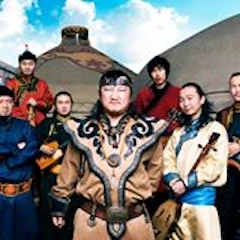Music Editor Darren Hassan spoke with Yilichi from Chinese musical act ‘Hanggai’ about their upcoming Womadelaide tour and new album, which will be coming out soon.
Hanggai, which translates as ‘a place with a blue sky, white clouds, grassland, river, mountain and woods is a perfect tag for this traditional folk outfit from mainland China with strong Mongolian roots whose music evokes the very images of nomadic Mongolian horsemen riding proudly through the plains of China in an era gone by. Thankfully, Hanggai are upholding these traditions through their music and their passion for cultural preservation.
About to jump on a plane to Holland, singer Yilichi mentions that the group has already been to Adelaide in 2011 as part of the Womadelaide Festival.
“We made many Mongolian friends who now live there and are really looking forward to seeing them again in March. Last visit, we had the opportunity to visit Melbourne, Sydney and the Blue Mountains and absolutely loved the Australian scenery. It reminded us a lot of Mongolia with its vast open spaces, greenery and overall energy.” Yilichi and the group also had the opportunity to try Australian produce on their last visit. “ We tried Australian Beer and red wine, I’ll try all kinds of beer, anything!” he laughingly says. Despite this, it wasn’t the inspiration for their song ‘Jiu Ge’ which translates as ‘Drinking Song’.
When asked about their experience with Australia food Yilichi says he has tried Roast Lamb leg, which reminded him a lot of a Mongolian roast. He is asked whether he tried kangaroo steaks, to which he replies “Not interested”. Upon hearing how common it is to eat our National emblem, and how delicious it is, he gleefully retorts with “OK, I’ll promise to give it a try next time”.
The group is officially based in Beijing, but actually hail from various provinces around China but use Beijing as the transit point for tours and rehearsals.
We discuss his rationale for the bands motivation into the more traditional sounds that they produce and he highlights the differences between the Mongolian and Chinese cultures by stating that “Mongolians are a minority and traditionally nomadic people, whilst the Chinese have many different ‘cultures within a culture’. For example, the Han Chinese consists of many ethnic groups that are primarily rural, farming types. When I was in my original punk group T9, I was much younger and rebellious, and as I got older I started to quiet down and change my style, including my music. It was a slow, gradual change over several years and, as Mongolian culture and music was a huge part of my life, it naturally influenced my style of music. There was a huge motivational reason to pursue this style of music in particular, as it is from my own cultural background and matches my own personality and style better.”
The group cites bands such as Pink Floyd and Radiohead as influences- Yilichi claims that “Pink Floyd’s music I find quite conflicting somehow, and they’ve influenced Hanggai’s style. We tend to swing between both traditional and contemporary music.” Hanggai’s music certainly does that, with one song being similar to an Irish jig and the next being more contemporary in its style.
As China begins to lead the 21st century as an economic superpower, Yilichi recognises and feels the rapid changes that are impacting traditional practices in China. Now that China is developing so rapidly, it is having an impact on the reservation of tradition cultures and folk culture in general. It is getting harder for the Chinese to maintain their passion for traditional music but this is what Hanggai want to do in expressing our love for this aspect of music culture, whilst adding a rock influence- this works for us!” says Yilichi
A prominent element of traditional Mongolian is throat singing, or Khoomei (pronounced who-may), which is epitomized by deep heavy chants that come directly from the throat and are synonymous with Buddhist chanting.
Yilichi learned the basics of this technique from his teacher in a relatively short time of three weeks, but says that more advanced techniques are developed over a long time, and is an ongoing process.
Clearly passionate and enthusiastic about his work, Yilichi is asked about what he enjoys most about his role in Hanggai. He responds by saying “I love touring to different countries and the new experiences it brings. Chinese and Western culture is quite different, and as everyone knows, China is a communist country so when we travel to different countries we actually feel priviledged. The opportunity to travel and experience different cultures has allowed me to discover and broaden myself more, as with the rest of the band”.
Hanggai are headed to Womadelaide 2014 in a spectacular lineup of international acts displaying such a diversity of genres and backgrounds. What can we expect from Hanggai this year?
“A new album is underway and should be released around the time we are touring Australia in March. It’s called ‘Back To You’ and will have 15 songs plus 3 chants in the ‘deep Buddhist throat chant ‘style”, says Yilichi.
This is great news for fans of the band, and Adelaide is set to be thoroughly entertained by the group next month. Hanggai will be playing at the Womad Festival from March 7-10.
Interviewed by Darren Hassan 5 Feb 2014





















